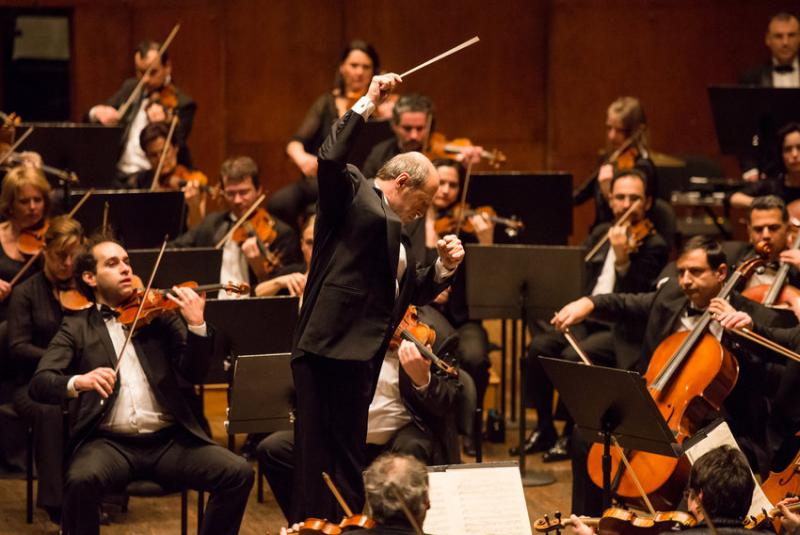Classical CDs Weekly: Yotam Haber, Janáček, Mahler | reviews, news & interviews
Classical CDs Weekly: Yotam Haber, Janáček, Mahler
Classical CDs Weekly: Yotam Haber, Janáček, Mahler
Eclectic chamber scores, vivid Czech orchestral music and an epic among symphonies

 Yotam Haber: Torus – Chamber Music 2007-2014 (Roven Records)
Yotam Haber: Torus – Chamber Music 2007-2014 (Roven Records)
Yotam Haber's We Were All is a vibrant setting of a short poem by Andrea Cohen. I first heard it while my iPod was in shuffle mode, and thought for a few seconds that I was listening to a work by Louis Andriessen. There's something of the Dutch composer's sharp clarity; what's the point in setting an interesting text if you then set it in such a way that audiences can't make out the words? Soprano, counter-tenor and tenor sing Cohen's poem to a transparent, though extrovert chamber ensemble backing. There's a brilliant moment five minutes in; Cohen's blackbirds gorge themselves on cherries and we get a minute of sublime, glittering calm. Haber describes himself as “a transplanted Dutch/Israeli who grew up in Nigeria and Milwaukee', which presumably accounts for his music's wide stylistic range. On Leaving Brooklyn's word setting is a little more conventional, with a brilliant role for soprano Mireille Asselin. That the words are less audible doesn't seem to matter: Haber states that he chooses texts “not for their meaning or their narrative, but for their sound.” Text becomes timbre. Both pieces are stunningly recorded, the vocals brilliantly assimilated into the mix.
The three instrumental pieces don't immediately grip in the same way, though give them time and they'll work their magic. Last Skin makes thematic reference to We Were All. The most striking feature is the noise it makes, the eight solo violins retuned so that their open strings can play a 16-note microtonal scale. The second section moves from disconcerting static chords to insectile scratchings, and it's never less than compelling. Haber's Torus is a spiky string quartet inspired by the rusting steel sculptures of Richard Serra. From the Book of Maintenance and Sustenance closes the disc in a more euphonious manner. An eloquent duet for viola and piano based on a Jewish liturgical melody, it's beautifully played here by violist Max Mandel and pianist Eric Huebner.
 Janáček: Orchestral Works Vol. 2 James Ehnes (violin), Bergen Philharmonic Orchestra/Edward Gardner (Chandos)
Janáček: Orchestral Works Vol. 2 James Ehnes (violin), Bergen Philharmonic Orchestra/Edward Gardner (Chandos)
Janáček's Taras Bulba is the one work included here that's almost standard repertoire. Everything else, baffingly, isn't. But should be. If you're feeling a little jaded, investigate The Danube, an idiomatic completion of an unfinished four-movement symphony. The whole thing is a little uneven, but, hey, it only lasts 16 minutes. The third movement is one of the most striking things you'll hear; a perky oriental-sounding woodwind line heard over a chugging bass accompaniment. It's already delectable, until the moment when Janáček gives the melody to wordless soprano (Susanna Andersson) and solo viola d'amore. Holy moley. This will be the quirkiest few minutes of music you'll have heard in ages, and a track that you'll be playing endlessly to family and friends. Fascinating too to hear Janáček's discarded prelude to Jenůfa, sounding astonishingly modern for a piece composed in 1895. There are a few thematic links to the opera but its five punchy minutes can happily stand alone. James Ehnes is outstanding in the reconstruction of the one-movement Violin Concerto, subtitled "The Wandering of a Little Soul", which reuses much of the material heard in the overture to From The House of the Dead. Janáček's chains rattle with sharp immediacy. Edward Gardner's opera house experience allows him to draw razor-sharp playing from the Bergen Philharmonic, matched by Chandos's close, rich sound.
The Ballad of Blaník is a pithy symphonic poem written to celebrate the founding of Czechoslavia, full of shifts of mood and tempo. There's a vivid reading of The Fiddler's Child, the orchestra's leader Melina Mandozzi playing the solo part. And there's still Taras Bulba. Few composers wrote so evocatively for tubular bells, and the organ entry near the start is beautifully engineered. Gardner steers us through the violent ups and downs of Taras's life with unerring skill, and the closing minutes are magnificent. Trumpets and lower brass are especially impressive – an exceptional, generously filled disc.
 Mahler: Symphony no 9 Budapest Festival Orchestra/Iván Fischer (Channel Classics)
Mahler: Symphony no 9 Budapest Festival Orchestra/Iván Fischer (Channel Classics)
This is very special indeed; one of the great recordings of this symphony. As good as Claudio Abbado's Lucerne Festival account; Iván Fischer makes the music chill, shock, delight and console. That the playing is so warm and stylish is an added bonus; this performance is shaped with enormous tenderness and strength. And, remarkably, there's never a hint of sentiment or excess aggression in the louder climaxes. It sings. I was won over by Fischer's treatment of the symphony's opening bars; flickering, sharply pointed ostinati in cello, horn and violas, as if a spring's being wound. There's a delicious sense of relief when the violin theme steals in, the uncertainties and ambiguities seemingly dissolved. This being Mahler, the resolution is a long time coming. Best of all is Fischer's handling of the collapse 12 minutes in, the Budapest Festival Orchestra's snarling trombones and horns on fine form. The funeral march has swagger, and there's no self-pity.
Inner movements have swifter speeds than we've come to expect and they're all the better for it. The Ländler has a very Viennese lilt, more nostalgic than nihilistic. The Rondo-Burlesque unfurls quickly but never feels rushed; Mahler's bittersweet interlude boasting a sublime trumpet solo. The real joy of this disc is the great Adagio. Fischer takes less than 23 minutes. It flows seamlessly, a very humane, affectionate farewell to life's transient pleasures. In Fischer's words, “the most tragic and beautiful ending Mahler ever composed.” I don't think I've ever heard the final pages played with such sweetness and warmth. Splendidly recorded, and Fischer's 76-minute timing means that the symphony fits snugly onto a single SACD.
Explore topics
Share this article
The future of Arts Journalism
You can stop theartsdesk.com closing!
We urgently need financing to survive. Our fundraising drive has thus far raised £49,000 but we need to reach £100,000 or we will be forced to close. Please contribute here: https://gofund.me/c3f6033d
And if you can forward this information to anyone who might assist, we’d be grateful.

Subscribe to theartsdesk.com
Thank you for continuing to read our work on theartsdesk.com. For unlimited access to every article in its entirety, including our archive of more than 15,000 pieces, we're asking for £5 per month or £40 per year. We feel it's a very good deal, and hope you do too.
To take a subscription now simply click here.
And if you're looking for that extra gift for a friend or family member, why not treat them to a theartsdesk.com gift subscription?
more Classical music
 Hallé John Adams festival, Bridgewater Hall / RNCM, Manchester review - standing ovations for today's music
From 1980 to 2025 with the West Coast’s pied piper and his eager following
Hallé John Adams festival, Bridgewater Hall / RNCM, Manchester review - standing ovations for today's music
From 1980 to 2025 with the West Coast’s pied piper and his eager following
 Kaploukhii, Greenwich Chamber Orchestra, Cutts, St James's Piccadilly review - promising young pianist
A robust and assertive Beethoven concerto suggests a player to follow
Kaploukhii, Greenwich Chamber Orchestra, Cutts, St James's Piccadilly review - promising young pianist
A robust and assertive Beethoven concerto suggests a player to follow
 Robin Holloway: Music's Odyssey review - lessons in composition
Broad and idiosyncratic survey of classical music is insightful but slightly indigestible
Robin Holloway: Music's Odyssey review - lessons in composition
Broad and idiosyncratic survey of classical music is insightful but slightly indigestible
 Classical CDs: Wolf-pelts, clowns and social realism
British ballet scores, 19th century cello works and contemporary piano etudes
Classical CDs: Wolf-pelts, clowns and social realism
British ballet scores, 19th century cello works and contemporary piano etudes
 Bizet in 150th anniversary year: rich and rare French offerings from Palazzetto Bru Zane
Specialists in French romantic music unveil a treasure trove both live and on disc
Bizet in 150th anniversary year: rich and rare French offerings from Palazzetto Bru Zane
Specialists in French romantic music unveil a treasure trove both live and on disc
 Scottish Chamber Orchestra, Ibragimova, Queen’s Hall, Edinburgh review - rarities, novelties and drumrolls
A pity the SCO didn't pick a better showcase for a shining guest artist
Scottish Chamber Orchestra, Ibragimova, Queen’s Hall, Edinburgh review - rarities, novelties and drumrolls
A pity the SCO didn't pick a better showcase for a shining guest artist
 Kilsby, Parkes, Sinfonia of London, Wilson, Barbican review - string things zing and sing in expert hands
British masterpieces for strings plus other-worldly tenor and horn - and a muscular rarity
Kilsby, Parkes, Sinfonia of London, Wilson, Barbican review - string things zing and sing in expert hands
British masterpieces for strings plus other-worldly tenor and horn - and a muscular rarity
 From Historical to Hip-Hop, Classically Black Music Festival, Kings Place review - a cluster of impressive stars for the future
From quasi-Mozartian elegance to the gritty humour of a kitchen inspection
From Historical to Hip-Hop, Classically Black Music Festival, Kings Place review - a cluster of impressive stars for the future
From quasi-Mozartian elegance to the gritty humour of a kitchen inspection
 Shibe, LSO, Adès, Barbican review - gaudy and glorious new music alongside serene Sibelius
Adès’s passion makes persuasive case for the music he loves, both new and old
Shibe, LSO, Adès, Barbican review - gaudy and glorious new music alongside serene Sibelius
Adès’s passion makes persuasive case for the music he loves, both new and old
 Anja Mittermüller, Richard Fu, Wigmore Hall review - a glorious hall debut
The Austrian mezzo shines - at the age of 22
Anja Mittermüller, Richard Fu, Wigmore Hall review - a glorious hall debut
The Austrian mezzo shines - at the age of 22
 First Person: clarinettist Oliver Pashley on the new horizons of The Hermes Experiment's latest album
Compositions by members of this unusual quartet feature for the first time
First Person: clarinettist Oliver Pashley on the new horizons of The Hermes Experiment's latest album
Compositions by members of this unusual quartet feature for the first time

Add comment